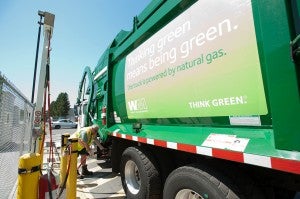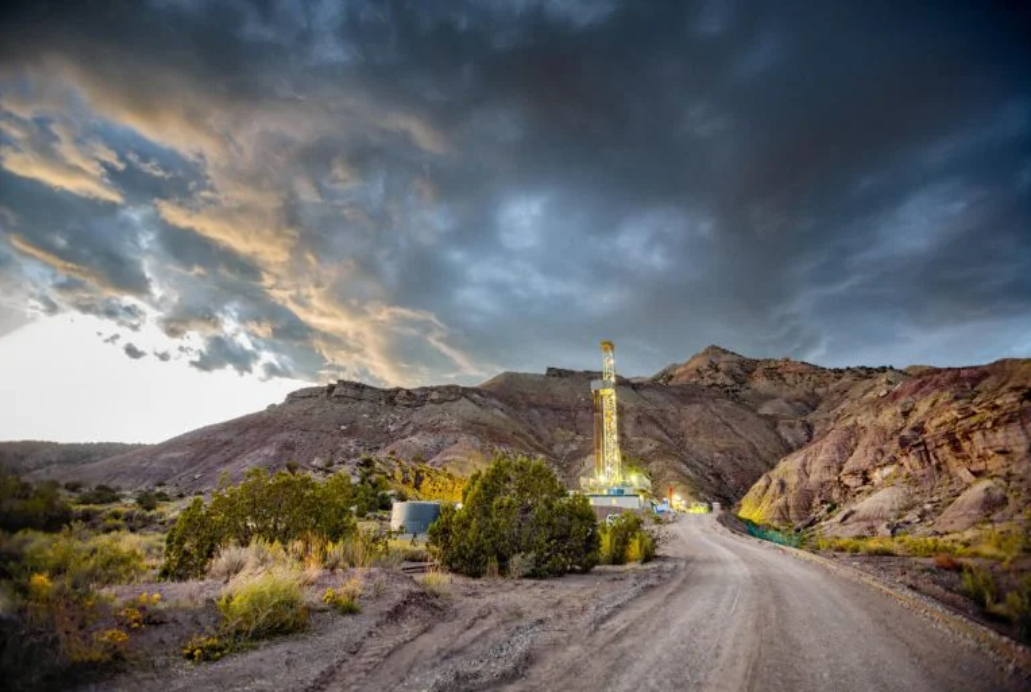Study Intends To Determine Methane Leakage Associated With A Growing Natural Gas Transportation Sector
This blog post was written by Jason Mathers, Senior Manager of EDF’s Corporate Partnerships Program.

The use of natural gas to power our nation’s freight fleet vehicles is a hot topic in these days of rising diesel and falling natural gas prices. There are several reasons to be excited about this opportunity, including operating cost savings, use of a domestic fuel source, and the potential for a reduction in greenhouse gas (GHG) emissions compared to diesel heavy-duty trucks. However, significant concerns remain with the development of new gas supplies, including the threat of fugitive methane emissions from natural gas vehicles and the fuel supply chain.
Methane is the main ingredient in natural gas and a GHG pollutant many times more potent than carbon dioxide (CO2), the principal contributor to man-made climate change. Even small amounts of methane leakage across the natural gas supply chain can undermine the climate benefit of switching to natural gas from other fossil fuels for some period of time.
In a paper published last year, EDF scientists and other leading researchers examined the impact of potential fugitive emissions on the climate benefits of a switch from diesel to natural gas heavy-duty trucks. The study found that, according to the best available data, methane leak rates would need to be below 1% of gas produced in order to ensure that switching from diesel to natural gas produces climate benefits at all points in time. They also found that – using the EPA leakage rate estimates at that time – converting a fleet of heavy duty diesel vehicles to natural gas would result in increased climate warming for more than 250 years before any climate benefits were achieved.
EDF is working with leading researchers and companies in a series of studies designed to better understand and characterize the methane leak rate across the natural gas supply chain. The studies will take direct measurements at various points across the production, gathering and processing, long distance transmission and storage, local distribution, and transportation. The first study, led by researchers at the University of Texas, is measuring emissions from natural gas production. Results will be released in the coming months.
Today, EDF is announcing its second major study as part of this overall project. This study aims to determine fugitive emissions of methane associated with routine operation of natural gas fleet vehicles fueled by compressed or liquefied natural gas. Joining EDF as study sponsors are the American Gas Association, International Council on Clean Transportation, PepsiCo, Shell, Volvo Group, Waste Management, Cummins Westport and Westport Innovations. Researchers with West Virginia University are conducting the assessment. The final results of this study will be submitted to a peer-reviewed journal, for publication hopefully in late 2013 or early 2014.
EDF Chief Scientist, Steve Hamburg said this about the study:
“Currently, there is no empirical data on methane leaks associated with natural gas vehicles, only estimates. In order to fully understand the scope of the matter, and what the opportunity is to minimize methane emissions during the operation and refueling of natural gas vehicles, hard data is needed. This study brings together multiple, key stakeholders to advance methane science with measurements taken under real-world conditions. This information will help shape the public debate of the role that the increased usage of natural gas vehicles can have on our transportation sector.”
This study on natural gas vehicles is timely. The U.S. trucking industry could be on the verge of a significant migration to natural gas vehicles. By 2020, 40 percent of new class 7 and 8 trucks sold could run on natural gas. This would be a marked increase from today’s market, which is dominated by diesel vehicles.
If fugitive methane emissions across the supply chain are below the critical threshold of 1%, a movement of this magnitude towards commercial natural gas fleet vehicles could be a solid win for the environment. Estimates based on fuel cycle models created by Argonne National Laboratory indicate the production and use of natural gas in transportation can reduce GHG emissions by 13 percent when compared with burning diesel fuel – if no fugitive methane emissions leak out from the system during the production, transport or use of natural gas. Given that freight trucks are on pace to increase their GHG emissions 44% by 2040 we need all the help we can get to bring these emissions down to the lowest level possible.
It is heartening to see the broad industry support in sponsoring this study. We appreciate the leadership shown by all of our industry partners. Their participation gives us a strong sense that we will be able to find solutions working with station owners, potential fleet operators of natural gas fleet vehicles and associated equipment manufacturers to craft a path forward that will enable heavy-duty natural gas trucks to live up to their potential.












One Comment
I’m concerned about our environment like most people are, but your continued bashing of natural gas usage in this country’s transportation sector really makes me mad. Natural gas is good of this country in so many ways. I’m starting to resent your “nanny state” positions on so many issues. It’s like you feel your point of view carries more weight than others. If this country uses natural gas we would not pollute transporting oils from far distances to our shores. We could reduce use of Venezuelan’s dirty oil. There are far too many other pros to state here. This country needs to strongly back use of natural gas in our transportation sector, NOW!!!!!!